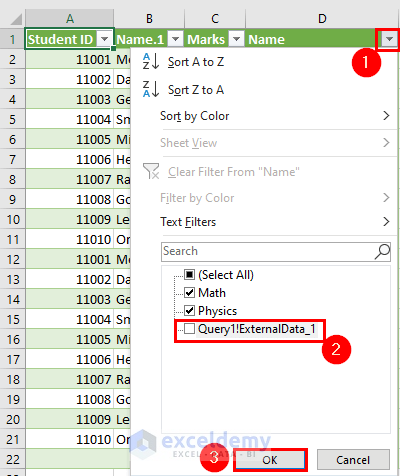7 Tips for Naming Your Excel Sheets Effectively

Ever found yourself lost in a labyrinth of Excel sheets, wishing there was a map to guide you? Well, you're not alone. Whether you're a business analyst, accountant, or just someone trying to keep track of their personal budget, naming your Excel sheets effectively can transform chaos into order. Here are 7 tips to ensure your Excel sheet names are both functional and user-friendly.
1. Use Descriptive Names

The cornerstone of effective naming is clarity. Instead of using generic labels like "Sheet1" or "2023_Data," opt for names that give an immediate understanding of what the sheet contains:
- 2023_Sales_Report: Clearly indicates it's a sales report for the year 2023.
- Q1_2023_Financials: Shows which quarter and year the financial data pertains to.
- Team_Leadership_Structure: Indicates the content is about team management.
🗒️ Note: Ensure the name isn't overly long, but informative enough to convey the sheet's purpose.
2. Include Dates Where Applicable

When dealing with time-sensitive data, including the date in the sheet name helps in tracking temporal changes:
- Project_Report_03_2023
- Year_End_Inventory_20231231
Such naming conventions help in organizing projects or reports over time, making it easier to locate and compare data from different periods.
3. Abbreviations and Acronyms

To keep sheet names concise, use universally understood abbreviations or acronyms:
- HR_Stats_2023 - for Human Resources statistics
- SOPs - for Standard Operating Procedures
- KPI - for Key Performance Indicators
🗒️ Note: Ensure the abbreviations you use are well-known within your organization or provide a legend if they're specific to your use case.
4. Hierarchical Naming

If your Excel workbook has multiple sheets that relate to each other, consider using a hierarchical naming approach:
| Name | Explanation |
|---|---|
| 1_Company_Overview | Overview of the company data |
| 2_Financials_By_Department | Breakdown of financial data by department |
| 2.1_Sales_Financials | Sales department financial data |
| 2.2_Marketing_Financials | Marketing department financial data |
| 3_Employee_Data | Employee related information |

This approach makes navigating through related sheets straightforward and logical.
5. Avoid Special Characters and Spaces

Special characters and spaces can sometimes complicate formula referencing and could lead to errors:
- Replace spaces with underscores: Product_List_2023 instead of "Product List 2023."
- Avoid characters like /,\,#,% which could break references or be misinterpreted by Excel formulas.
🗒️ Note: Use underscores to mimic spaces for readability, but remember, underscores are still characters in Excel.
6. Keep it Consistent

Consistency in naming conventions across your Excel workbooks creates a seamless workflow. Here are some practices:
- Use consistent date formats.
- Maintain a similar structure or naming pattern for related sheets.
- Avoid mixing singular and plural forms or different terminology for similar data.
Consistency not only makes it easier for others to understand your work but also helps you when revisiting documents after a long time.
7. Short but Informative

The final rule is balance. While descriptiveness is crucial, the name should still be short enough to fit within Excel's character limit for sheet names:
- Instead of "Human Resources Staff Data for the First Quarter of 2023," use HR_Staff_Q1_2023.
- Instead of "Financial Analysis for the Entire Year Including Projected Revenue," use Finance_Analysis_2023.
🗒️ Note: Ensure that the name is still informative while being concise. Over-abbrieviation can lead to confusion.
In the modern workplace, where data reigns supreme, organizing it efficiently is no less than an art. The effective naming of Excel sheets is a critical skill that enhances productivity, reduces errors, and makes data management straightforward. By adopting these seven tips, you're well on your way to transforming your Excel workbooks into well-organized, easily navigable repositories of information. Remember, a well-named sheet is the first step towards clear communication, collaboration, and ultimately, smarter decision-making.
Why is it important to name Excel sheets?

+
Naming Excel sheets helps in organizing data efficiently, making it easier to locate, understand, and navigate through the workbook, reducing time spent searching and increasing productivity.
Can I use special characters in Excel sheet names?

+
It’s best to avoid special characters in sheet names as they can cause issues with formula references and overall Excel functionality. Use underscores instead of spaces and keep characters to a minimum.
What should I do if I have sheets with similar names?

+
If sheets have similar names, differentiate them using sub-categories, dates, or by appending numbers if they are part of a sequence. For example, “2023_Sales_By_Region_01” and “2023_Sales_By_Region_02.”